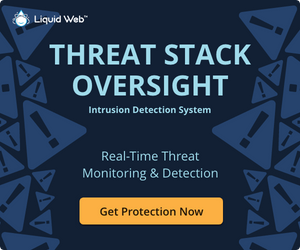Hardware Firewalls: An Overview of Benefits and How They Keep You Secure
Security is a subject that gets more and more attention every day, and rightly so! Between our ever-growing reliance on storing our data and the disclosing of major breaches by big names across the world, there are fewer terms that hold the same weight. At Liquid Web, we take this subject incredibly seriously, and offer several products to make sure we meet your security needs. Today we’ll discuss one such product whose primary function is simply keeping things secure: Hardware Firewalls.
What is a Hardware Firewall?
A Hardware Firewall is a physical device similar to a server that filters traffic to a computer. Instead of plugging the network cable into the server, it is connected to the firewall, positioning the firewall between the uplink and the computer. Like a standard computer with a processor, memory, and sophisticated software, these devices also employ powerful networking components (hardware and software) and force all traffic traversing that connection to be inspected by configurable rulesets which grant or deny access accordingly.
Everyone who has ever used a computer can probably tell you a story about being blocked in a firewall somewhere. As good Internet citizens, we encounter firewalls all the time, usually in the form of a software firewall running on a personal laptop or workstation. Their function is surprisingly modest. They inspect traffic as it enters and leaves the computer and, based on some simple rules, either allow or deny that traffic.
Some common examples of software firewalls you may be familiar with are:
- WindowsFirewall
- UFW
- IPTables
- FirewallD
A Hardware Firewall is the same except it lives outside of the server.
How Do Hardware Firewalls Work?
The hardware firewall is setup differently depending on your current configuration. The firewall is situated outside your server and is connected directly to your uplink. If this is a new setup, the Firewall is then connected to your server. If this will be a new setup to a production server, a maintenance window would be scheduled to handle the physical connection. Once the connection to the server is established, all traffic to and from the server goes through the firewall, forcing it to pass inspection. This allows you to have granular control over the type of traffic you’re receiving, which is incredibly important.

Five Key Benefits Hardware Firewalls Provide
1. Traffic Control
The ability to decide which traffic should and shouldn’t reach your server.
2. Default Rules
A fully configurable list of default rules which can be applied to all traffic.
3. Port Access
Granular control to tailor rules with options like allowing all traffic to your website or ensuring only you and your developer can access SSH ports or RDP.
4. Managed Equals Control On The Fly
Access to a fully staffed networking team to configure, troubleshoot, or adjust controls on the fly.
5. Additional Server Resources
Access to additional server resources that would otherwise be utilized. You can even disable the software firewalls from your server and rely completely on the Hardware Firewall, freeing up valuable memory and processor for the functions and services that your business needs to continue being successful.
Is There Anything Else Hardware Firewalls Can Do?
Of course! Along with the powerful inspection functions we already discussed, one of the other major benefits is the ability to run a VPN connection. This connection, which is also a fully managed offering, allows a whole new level of security, access, and encryption to your already secured cluster. With a managed VPN connection, you can have the security and control to grant access to the people who need secure access anywhere there’s a stable Internet connection. Are you working from home? No problem! Are you traveling? Easy! Access is at your fingertips from any location with Internet. It’s the mobility you need to stay flexible in a changing environment. Learn more about exactly what a VPN (or a VPN tunnel) is at our Knowledge Base.
What if I Have More than One Server?
No problem. Liquid Web is a proud Cisco shop and stocks several versions of their hardware firewall devices. These devices are also powerful enough to handle traffic from multiple servers. Further, if at some point you outgrow one, because of our multiple model offerings, we can work with you to plan out an upgrade to the hardware so your security can be scaled along with your business.
We also employ a full staff of dedicated networking professionals 24/7/365 who can manage and maintain your fully managed networking infrastructure with no issues. This service includes setup, configuration, and even upkeep in the case of potential exploits that are announced to the world. Our teams are only an email or phone call away, which leaves you with peace of mind and valuable time you can use to focus on the things that matter most.

Jerry Vasquez
A self-professed pirate captain with two decades of leadership experience, Jerry has led teams from 60+ cooks and chefs to 16 networking engineers. He brings those years of experience to his current role as Product Manager at Liquid Web, focusing on networking and security products. When not working or sleeping, Jerry can usually be found eating and having a good conversation with good people.
Keep up to date with the latest Hosting news.




